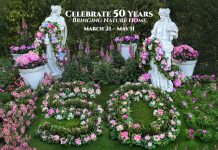Yesterday we sat at breakfast in Birmingham, Ala. My friend Jean and her daughter Sara had flown in to meet us.
We spoke to Mirian Monago, now in her 50s, who worked at our hotel. We learned she is a former teacher and enjoys her hobby as a jazz singer. We felt an instant connection with this beautiful, gentle voiced, intelligent woman. We discussed books and places to visit. We mentioned we would be visiting the Civil Rights Institute and the 16th Street Baptist Church. That is when she told us her memory of being an 8-year-old girl in Birmingham in 1963, happy to have an older, wiser friend to look up to – 11-year-old Denise McNair.
Denise treated Mirian as a friend, not just a little kid. Mirian’s smile widened as she remembered, “I was thrilled at having an older friend. I really looked up to her.”
On the morning of Sept. 15 that year, the friendship was cut short. Four members of the Ku Klux Klan planted a box of dynamite under the steps of the 16th Street Baptist Church. The church was filled, including 26 children. The explosion happened at 10:22 a.m., killing four girls. One was Denise McNair.

Mirian welled up as she told us that when she has a jazz concert, she will often silently think, “This is dedicated to you Denise.” She wonders what Denise would have become had her life not been taken away so early. This hit close to home as my 11- and 9-year-old daughters listened intently. Sally, 9, looks up to the older girls in her theater group. There are a few who treat her like a friend – not just a little kid. Mirian and my girls shared something deep. We all share it, the desire to have a true friend and the joy of having one. May my girls never, ever have to experience, the unspeakable pain of one being murdered.
No textbook, no lecture could have been a more effective tool in teaching my kids something about the Civil Rights Movement, and about humanity. No test could ever measure what they learned, but I knew, when I saw them hug Mirian goodbye and later as we stood in the 16th Avenue Baptist Church.
This is the heart of the Great American Field Trip.
Planning this cross-country journey, I knew one of the most important parts would be visiting the Deep South and learning about the Civil Rights Movement.
We had a blast in Savannah and in Athens, Ga., at the University of Georgia, but, as much as the South is known for its beauty, comfort food, and Southern hospitality, it is also where some of our nation’s ugliest and shameful events took place. Terrifying acts of hatred and injustice against black people was the norm for a sickening amount of time. With hate group memberships soaring in this country, there is still work to be done. The wounds of the Civil Rights Movement run deeper than I ever thought possible. The dichotomy of strength and grace, the courageous acts of ordinary people against the backdrop of segregation is difficult to comprehend.
I was happy to have to company of another adult during this part of our journey. Jean was someone to share the tears and heaviness of what we saw and learned, someone to help me try to explain to my kids what I am unable to explain to myself.
I will end with excerpts from Sally’s and Janey’s journals, with permission. Sally drew two thumbs on the page of her journal, one was colored in with her ballpoint pen, one was not. Next to the thumbs she wrote “You tell me the difference, that is a white thumb and a black thumb. That is how they judged respect. There is no difference!”
Janey wrote, “Today was a really intense day. First the day started out with us coming across a woman who worked at our hotel at breakfast. She knew one of the girls who died when the KKK bombed the church. How heartbreaking. I have to write about it tomorrow because I’m still trying to get over it.”




